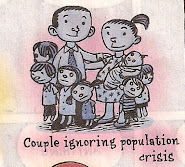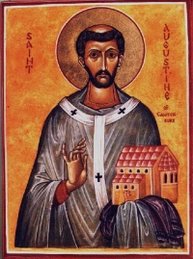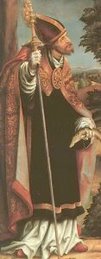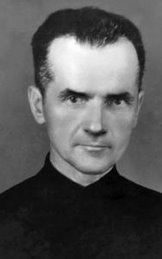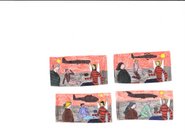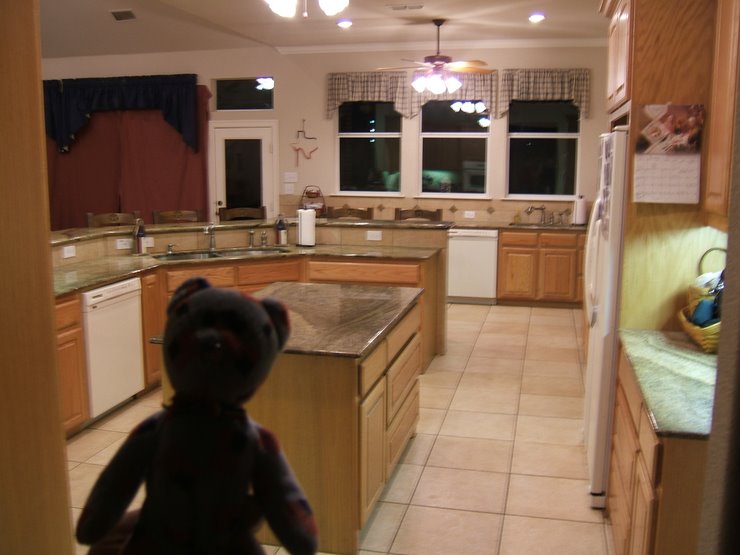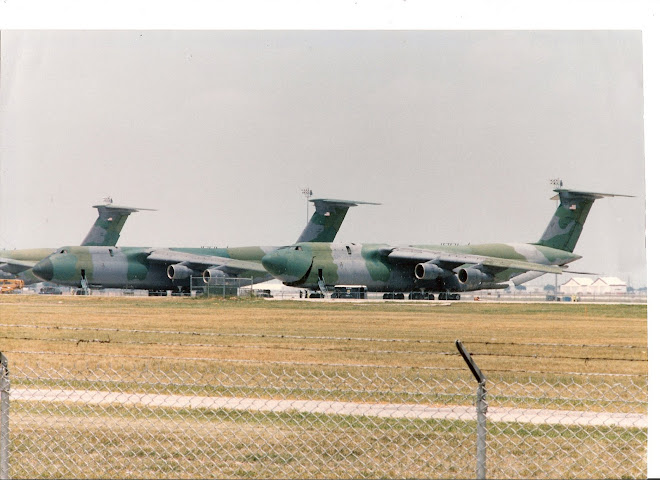Please pray for the repose of the soul of Michael Bookalil, M.D.
Theodore's Memorial Video
Friday, February 24, 2012
Riding Shotgun, #10
Let's kick off Lent with the resumption of 'Riding Shotgun,' where I pray for the repose of the soul of people I know. Nine years ago today, this Australian doctor died. He was an anesthesiologist, and while I never met him, we occasionally discussed things via e-mail.
Monday, February 06, 2012
Feast of the Martyrs of Nagasaki, Japan in 1597
February 6th is the Feast of the Martyrs of Nagasaki. In 1597, St. Paul Miki and Companions were crucified on a hill overlooking Nagasaki.
Shorty before the United States entered the Second World War, a Japanese man took Paul - from St. Paul MIki - as his baptismal name. Paul Takashi Nagai was a physician in Nagasaki, and he survived the atomic bomb which was dropped on it on August 9, 1945. He pointed out, in a speech given for the funeral for the 8,000 Catholics who died in Nagasaki, how the Cathedral had been offered up as a sacrifice for an end to the war:
Shorty before the United States entered the Second World War, a Japanese man took Paul - from St. Paul MIki - as his baptismal name. Paul Takashi Nagai was a physician in Nagasaki, and he survived the atomic bomb which was dropped on it on August 9, 1945. He pointed out, in a speech given for the funeral for the 8,000 Catholics who died in Nagasaki, how the Cathedral had been offered up as a sacrifice for an end to the war:
On August 9, 1945, at 10:30 A.M. a meeting of the Supreme Council of War was held at the Imperial Headquarters to decide whether Japan should capitulate or continue to wage war. At that moment the world was at a crossroads. A decision was being made that would either bring about a new and lasting peace or throw the human family into further cruel bloodshed and carnage.
And just at that same time, at two minutes past eleven in the morning, an atomic bomb exploded over our district of Urakami in Nagasaki. In an instant, eight thousand Christians were called into the hands of God, while in a few hours the fierce flames reduced to ashes this sacred territory of the East. At midnight of that same night the cathedral suddenly burst into flames and was burned to the ground. And exactly at that time in the Imperial Palace, His Majesty the Emperor made known his sacred decision to bring the war to an end.
On August 15, the Imperial Rescript which put an end to the fighting was formally promulgated, and the whole world welcomed a day of peace. This day was also the great feast of the Assumption of the Virgin Mary. It is significant to reflect that Urakami Cathedral was dedicated to her. And we must ask if this convergence of events—the ending of the war and the celebration of her feast—was merely coincidental or if there was here some mysterious providence of God.
I have heard that the second atomic bomb, calculated to deal a deadly blow to the war potential of Japan, was originally destined for another city. But since the sky over that city was covered with clouds, the American pilots found it impossible to aim at their target. Consequently, they suddenly changed their plans and decided to drop the bomb on Nagasaki, the secondary target. However, yet another hitch occurred. As the bomb fell, cloud and wind carried it slightly north of the munitions factories over which it was supposed to explode and it exploded above the cathedral.
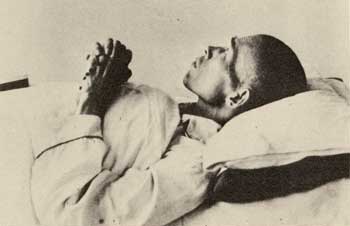 | |
| Dr. Nagai praying |
This is what I have heard. If it is true, the American pilots did not aim at Urakami. It was the providence of God that carried the bomb to that destination.
Is there not a profound relationship between the destruction of Nagasaki and the end of the war?
Nagasaki, the only holy place in all Japan—was it not chosen as a victim, a pure lamb, to be slaughtered and burned on the altar of sacrifice to expiate the sins committed by humanity in the Second World War?
The human family has inherited the sin of Adam who ate the fruit of the forbidden tree; we have inherited the sin of Cain who killed his younger brother; we have forgotten that we are children of God; we have believed in idols; we have disobeyed the law of love. Joyfully we have hated one another; joyfully we have killed one another. And now at last we have brought this great and evil war to an end. But in order to restore peace to the world it was not sufficient to repent. We had to obtain God’s pardon through the offering of a great sacrifice.
Before this moment there were many opportunities to end the war. Not a few cities were totally destroyed. But these were not suitable sacrifices; nor did God accept them. Only when Nagasaki was destroyed did God accept the sacrifice. Hearing the cry of the human family, He inspired the emperor to issue the sacred decree by which the war was brought to an end.
Our church of Nagasaki kept the faith during four hundred years of persecution when religion was proscribed and the blood of martyrs flowed freely. During the war this same church never ceased to pray day and night for a lasting peace. Was it not, then, the one unblemished lamb that had to be offered on the altar of God? Thanks to the sacrifice of this lamb many millions who would otherwise have fallen victim to the ravages of war have been saved.
How noble, how splendid was that holocaust of August 9, when flames soared up from the cathedral, dispelling the darkness of war and bringing the light of peace! In the very depth of our grief we reverently saw here something beautiful, something pure, something sublime. Eight thousand people, together with their priests, burning with pure smoke, entered into eternal life. All without exception were good people whom we deeply mourn.
How happy are those people who left this world without knowing the defeat of their country! How happy are the pure lambs who rest in the bosom of God! Compared with them how miserable is the fate of us who have survived! Japan is conquered. Urakami is totally destroyed. A waste of ash and rubble lies before our eyes. We have no houses, no food, no clothes. Our fields are devastated. Only a remnant has survived. In the midst of the ruins we stand in groups of two or three looking blankly at the sky.
Why did we not die with them on that day, at that time, in this house of God? Why must we alone continue this miserable existence?
It is because we are sinners. Ah! Now indeed we are forced to see the enormity of our sins! It is because I have not made expiation for my sins that I am left behind. Those are left who were so deeply rooted in sin that they were not worthy to be offered to God.
We Japanese, a vanquished people, must now walk along a path that is full of pain and suffering. The reparations imposed by the Potsdam Declaration are a heavy burden. But this painful path along which we walk carrying our burden, is it not also the path of hope, which gives to us sinners an opportunity to expiate our sins?
“Blessed are those that mourn for they shall be comforted.” We must walk this way of expiation faithfully and sincerely. And as we walk in hunger and thirst, ridiculed, penalized, scourged, pouring with sweat and covered with blood, let us remember how Jesus Christ carried His cross to the hill of Calvary. He will give us courage
“The Lord has given: the Lord has taken away. Blessed be the name of the Lord!”
Let us give thanks that Nagasaki was chosen for the sacrifice. Let us give thanks that through this sacrifice peace was given to the world and freedom of religion to Japan.
May the souls of the faithful departed, through the mercy of God, rest in peace. Amen.
(From The Bells of Nagasaki by Takashi Nagai, Kodansha International, 1984, pp.106-110)
Dr. Nagai's wife Maria died in that explosion as well. Shortly after the war ended, he was diagnosed with leukemia. Here he is with two of his children:
D
Subscribe to:
Posts (Atom)
Our Lady of the Mysterious Decapitation
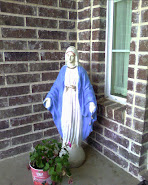
Now restored with the help of some cement!
Prayer to Our Lady of the Mysterious Decapitation
Mary my mother, take my hand today, and all days.
Lead me away from all occasions of sin.
Guide me in fulfilling your last words in the Gospel,
"Do whatever He tells you."
Amen.
Lead me away from all occasions of sin.
Guide me in fulfilling your last words in the Gospel,
"Do whatever He tells you."
Amen.









